The sunset on Harrison Square for the final time in 2008 this past Wednesday.
Photo from the City’s OxBlue webcam.
Â
Courtyard by Marriott Hotel
With Wednesday’s sunset, 2008 ended as well as another construction-start deadline. Â Construction was supposed to have begun on the Courtyard by Marriott Hotel by December 31st 2008. Â I spoke with Greg Leatherman, Redevelopment Executive Director, who shared with me Wednesday that he’d called White Lodging previously in the week, but that they weren’t in their offices and he had not received a return phone call. Â At this point, another amendment will have to be passed by Redevelopment to allow more time for White Lodging to begin construction. Â As we know, the current credit crisis and economic climate has made securing construction loans next to impossible. Â
Personally, I think the extension is acceptable at this point, given what’s been going on, however, I do think a concession by White Lodging would be in order. Â As you may know, repayment of the bonds issued to secure the City’s side of the required financing for Harrison Square is dependent on revenues generated by the TIF district of which the Courtyard by Marriott and retail/condominium building The Harrison are parts. Â Perhaps when making these extensions, the developers should concede some of the money awarded through tax abatements, or credits given to them. Â If this truly is a partnership, and the City easily grants these extensions, as the circumstances dictate, then the City should reap some sort of advantage as well. Â
At this point, given the bigger picture, it is too early to talk of seeking legal remedy. Â Whether or not the City should have gotten into this, or whether or not the developers should have been able to secure financing, whether or not…. I could recite the litany by heart, but I’ll save it for the comments – the point is: Â this project must be realized. Â We must be patient. Â We must give it time. Â I don’t think we’ve reached the point where we begin to view it as a failure. Â With that said, White Lodging must appear before City Council, Redevelopment, the public of Fort Wayne, in some venue to assure us they are still part of this project before another amendment is passed. Â To not officially have notified the City of non-start of construction is not a good sign and only gives fodder to the opponents of the project.
On an unrelated note, White Lodging is having trouble securing loans in Austin Texas for a 1,000 room Courtyard by Marriott Hotel. Â Excerpts from an article in the American-Statesman:
Austin’s biggest hotel project, a planned 1,000-room Marriott on Congress Avenue, has been postponed, in the most dramatic evidence so far of how the credit crunch is slowing commercial development.
[…] But developers are having trouble getting financing, or facing dramatically altered terms for projects where they already had commitments.
[…] “The national economic crisis has brought the financing of future hotel projects to a screeching halt,” said Randy McCaslin, a vice president with PKF Consulting , which tracks the hotel market. “If a project did not have its financing commitments before the crisis, it is unlikely that it will get financed until the middle of 2009 or later.”
Construction of the 26-story Marriott originally was to have started this year. Then the timetable was bumped to 2009.
Now the developer, White Lodging Services Corp. , is giving no revised start date.
“This is the most difficult time in recent memory to crystal-ball the upcoming year due to the unparalleled severity of the economic downturn and the fact that the financial community remains in a holding pattern,” said Deno Yiankes , president and chief operating officer of investments and development for White Lodging.
Council Member Mike Martinez said a White Lodging representative told him this week that the project is on hold and that the company had been unable to obtain financing. He said White Lodging might be considering alternatives, including a smaller project.
White Lodging has projected its 1,000-room hotel would generate 600 jobs and $7 million a year in property and hotel occupancy taxes.
The postponement also is a setback for the city’s aspirations to attract large-scale conventions.
The Marriott would be Austin’s biggest hotel, with 85,000 square feet of meeting space. It would add the global marketing clout of a top-tier hotel chain to efforts to recruit the big conventions that need hundreds of rooms.
[…] “Without more hotel rooms, the convention center will not be able to reach its potential,” McCaslin said.
The postponement has special irony because of the fierce controversy surrounding the Marriott, which displaced the popular Las Manitas Cafe, a day care center and a folk art store. That set off a citywide debate over preserving local businesses downtown versus the jobs and taxes that development creates.
[…] Some experts say the slowdown will help keep the hotel market from becoming overbuilt.
“Current conditions in the capital markets will make it very difficult to secure financing for new projects for the foreseeable future, so I don’t anticipate an oversupply of rooms in Austin, especially in downtown Austin,” said Beau Armstrong, chief executive of developer Stratus Properties Inc. , which is developing the W Hotel.
Â
The Harrison
Since Chris Schoen and Jim Irwin with Barry Real Estate appeared before the City Council to give an update on November 25th, 2008, there has been no further news on the project’s advancement. Â Securing financing has been a problem for this developer as well. Â To their credit, Barry Real Estate has been much more responsive to requests for updates from the City Council and Redevelopment. Â Part of this may be due to the fact that they are also owners of the ball team that will play in the development’s backyard. Â But I’ve always felt they would be as involved as they have been simply because it’s the right thing to do and they strike me as people who understand the value of their word and promises. Â In the November meeting, Chris Schoen set a “drop-dead deadline” of opening day for start of construction on The Harrison. Â When I spoke to Jim Irwin earlier in December, he assured me that Barry Real Estate is doing everything possible to secure the financing and that the project will be completed.
Â
Meyer Park, Parking Deck and Parkview Field
Work on these three components continue with the projects on-time and on-budget, despite a fire on the south side of the parking deck earlier in December. Â The fountain works were being installed at Meyer Park on my last visit. Â Also, brick work continued on the main entrance way at Jefferson Boulevard and Webster Street. Â Columns were being installed on the north side of the ballpark which will eventually support the concourse and become the parking garage for The Harrison. Â Work on the ballpark structure itself continues, with much of the exterior steel work underway. Â Seats will be installed starting the 12th of January and it is hoped the TinCaps Administrative offices will be completed the end of this month for move-in by the staff.
Â
Parking Plans
The City took delivery of the Parking Study Steering Committee’ s consensus decisions, completed last November, on December 3rd.  It was promised during this meeting that the full report would be made available on the City’s website as soon as possible.  As of the end of December this hadn’t been done. Â
The Steering Committee agreed that a definite plan for Harrison Square parking, and more specifically Parkview Field, must be the first and most important priority to be completed. It mandated this to be in place by February 15th 2008. Â That is less than 45 days away. Â Opening Day is just over 4 months away. Â I’ll be checking to see what the status of the project is.
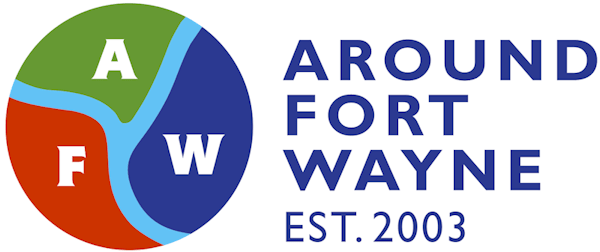
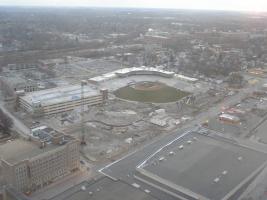
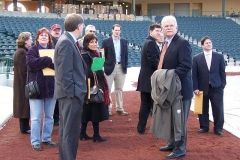
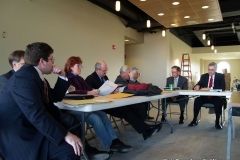
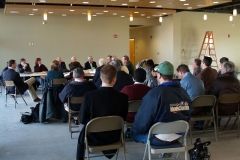
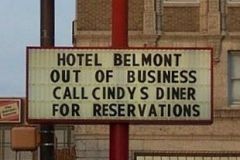
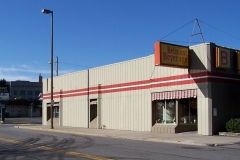
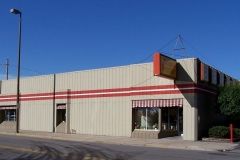
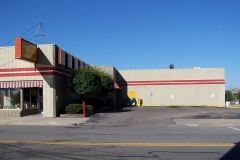
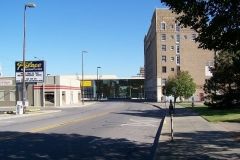
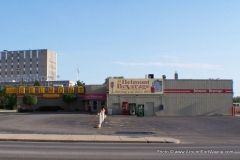
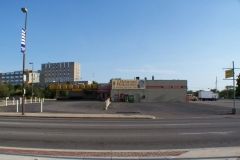
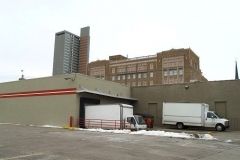
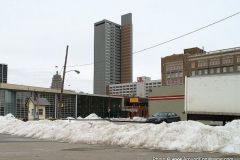
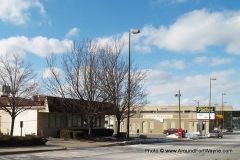
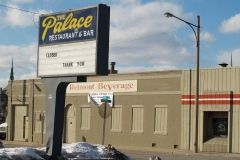
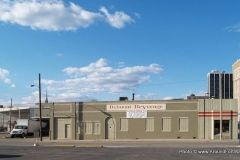
The story from Austin is sounding more and more like our situation:
Quoting the article from the “American-Statesman”: “The postponement has a special irony because of the fierce controversy surrounding the Marriott, which displaced the popular Las Manitas Cafe, a day care center and a folk art store.”
Does this sound at all familiar? The Harrison Square development displaced the popular “Bill’s Palace”, the “Great Beginnings” (Also known as Martin Luther King Montessouri School) and an engineer supply store, Eastern Engineering Supply. And we also had a controversy that surrounded this project.
Is it possible that the repeated bad outcomes of our redevelopment operation will finally be analyzed to see that the cause is “you can’t justify taking what the market calls a poor economic risk by throwing tax revenue at it!!!”
Mr Kalb – I gather youre against the project, but I don’t understand your cause and effect analysis. Are you saying this project in only suffering the consequences current affecting the entire economy because there was tax revenue used in funding the public portion?? By that same logic, infrastructure improvements would fail, school operations would fail, public safety would fail… heck, even garbage collection would fail. There is some risk (and even market opposition) for each and every one of those undertakings, yet you can see how ridiculous the equation is in those circumstances.
Ronda – If you will read again – “If the market calls it a POOR ECONOMIC risk(leading to non-support financially), et al”. In what possible way could garbage collection, school operations, public safety and NEEDED infrastructure improvements fall under this logical statement?
I read it again, and I still fail to see the connection. What market are you referring to? Public opinion (of a select, very vocal few), the actual investors that bought every last dime of the bonds, or some other market? In addition, for this project there is quite a bit of financial support, so if poor economic risk leads to non-support financially as you state above, the equation doesn’t work here.
However, my point is if it is public opinion that you refer to, then the market was rather split on the Harrison Square topic – many for, many against – as is the circumstance in all the areas I referenced. (You can barely find a public project or use of revenue that doesn’t inspire petitions, heated debate, and referendum threats anymore. I’ll grant you that the garbage collection issue was a few years ago, but still – it was heavily debated, as are school operations and public safety EVERY year, and these are funded by tax revenue. Even City Council is split on these issues, with some members wanting to slash operational budgets without knowing the repercussions of doing so.) Further, as much as I recognize and understand your displeasure with the project, the time to declare this risk realized or averted has not arrived yet.
Finally, the debate between necessary and unnecessary in regard to infrastructure improvements is quite subjective. There does not appear to be a magic criteria that qualifies “necessity”. Personally, I am far more annoyed at the proposal for <1.0 mile of Ardmore Ave. that will benefit so few individuals and areas than I am over the infrastructure investment for this project, where the improvements will assist so many residential areas and businesses in and close to downtown. I don’t understand how that can be considered necessary… but, that is a discussion for another thread.
By “market”, I believe that John Kalb is referring to that if Hardball really believed that a downtown ballpark would a profitable venture, then they would have not required public funds to build the new park.
“Necessity” means “need”. If a person would suffer injury, illness, or death without an object, then that person needs that object. If that person would remain physically healthy without that object but still insists on receiving it, that person still does not need it. He or she merely wants it.
So as a city, we need things like police and firefighters, since these professionals save lives. We need roads so that we can go to work and earn a living, and then go out and buy the staples of life. I would even go so far to argue that we need leisure, to promote our mental well-being. But there are so many cost effective ways of entertaining one’s self that there is no need for the city to subsidize forms of entertainment such as sports.